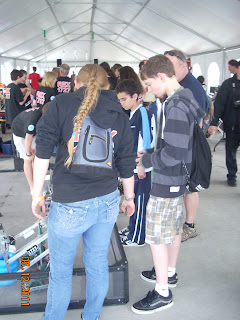We had a toddler and I was six months pregnant when we moved away from northern New Jersey -- and all of our family -- to the Baltimore suburbs. I was only half joking when I quipped, "There are two police shows on TV. The one in New York is Law & Order and the one set in Baltimore is called Homicide."
| Baltimore legend has it that a couple of robbers stumbled onto the set of Homicide, thought the actors in uniforms were real cops, and turned themselves in. |
One of the best things about this area is how close we are to the nation's capitol. So many museums and festivals are free and family-oriented. Two years ago, we went to Goddard Space Flight Center's Explore@ NASA day. It was this giant, free open house. For my science-minded kids: total awesomeness.
 |
| My son chats with a high school robotics team at Explore@ NASA Day. He is now on his high school robotics team, which will compete at the VEX world championships this spring! |
 |
| Wall art showing all of the current satellite missions. So cool! |
With scientific wonders all around, I was gob-smacked by the strange names on this Moon map. The Marsh of Decay? The Sea of Serenity? But the Moon does not have water. Intriguing.
I never put the idea away completely, I just didn't have an anchor for it -- something to make a poem and not just a list of evocative lunar place-names.
Until I picked up a postcard. It comes from the planetarium at the Franklin Institute (Philadelphia). I've never been there. I found the card in a local antique store. Somehow, it was the jumping off-point I needed.
Places on the Moon
The Lake of Dreams
is wider than the Lake
of Perseverance,
but come daylight
both dissolve in a Sea
of Vapors. My love,
let us swim diligent laps
in the Lake of Goodness,
and idle together
in the Lake of Sorrow.
Oh, take me
to the Lake of Joy
for the Lake of Winter
is frozen. Float me
in the downy Lake
is frozen. Float me
in the downy Lake
of Softness and speak not
of the Lake of Death.
Take me back
to the moonlit Lake
to the moonlit Lake
of Summer, the paper boats
we filled with candles
we filled with candles
until the water blinked
with starlight, or have you
drunk from the Lake
of Forgetfulness,
turned back to the house,
turned back to the house,
your gaze earthbound?
by Laura Shovan
Postcard Information:
“SCIENCE MUSEUM OF THE FRANKLIN INSTITUTE:
Philadelphia, Penna. The planetarium will reproduce the night skies as seen from any place in the world.”
“Photo & Pub by Joseph F. Morsello”
| In researching this poem, I learned that early astronomers mistook dark areas on the Moon for bodies of water. |
Draft one of the poem began with the Lake of Summer. When I was revising, I realized that this memory (it was a summer camp tradition) was the beating heart of the poem. "The white hot center of the poem" has become a sort of poetic aphorism, like "show me, don't tell me." But for this poem, that key image did need to move closer to the center.
I can't find information about another Explore@NASA Day, but I can recommend another free, huge and super-cool family science event. The next USA Science and Engineering Festival is scheduled for April, 2014. We went to the inaugural festival last spring. You may not get a tour through NASA mission control, but your mind will still be blown by all the hands-on science activities.



6 comments:
So much to love about this post! I've always wanted to go to Explore NASA Day -- you have made me more determined to attend the next time they hold it. And I love the Franklin Institute. I hope you get to visit. Most importantly, I heart your moonstruck poem. It glides along as though gravity is lighter there. (Acknowledgment: I stumbled a little on "turned back to the house.")
Thank you for the feedback, Tabatha. I knew the concluding lines weren't quite there, so I appreciate you pinpointing that line. Wondering whether I could get away with cutting it altogether: "or have you
drunk from the Lake
of Forgetfulness,
your gaze earthbound?"
I have studied the moon several times with students, Laura, & feel that I missed something by not exploring the names further. Don't you wonder who chose all these. Evidently they are science-based choices, hence the Latin & then the translations. I love that your poem speaks to another with love & allusions to times past-special.
Yes, that could work!
I love this poem. The geographer in me connects with the use of names (I and my colleagues spend a lot of time pondering the impact of names for places and other geographic areas and the often political issues that must be considered). The poet in me loves the playful way you've brought the names together in the poem, which draws attention to how whimsical and absurd the names of the Moon's features actually are.
Thanks, Mike. You really got where I was hoping to go with this poem. The names are absurd, but there's also something romantic and wistful about them.
Post a Comment